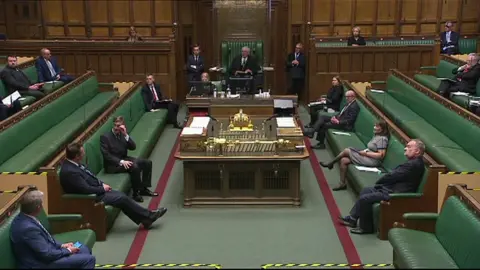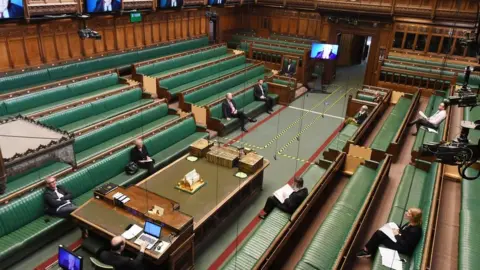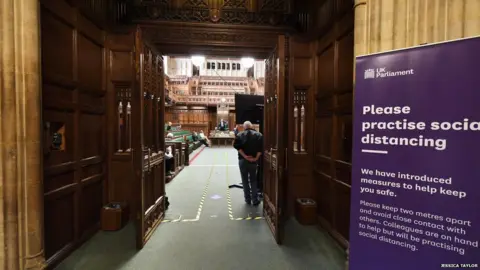Coronavirus: MPs approve new working arrangements as Commons returns
The House of Commons has returned in "exceptional and unprecedented" circumstances, the Speaker says.
Sir Lindsay Hoyle opened the first day back since the Easter recess amid the coronavirus crisis.
A "hybrid" Parliament - with some MPs in the chamber and others connected via video link - will begin on Wednesday after MPs approved the plan.
Leader of the House, Jacob Rees-Mogg, said the Commons could not let "perfect be the enemy of the good".
Under the motion agreed by MPs, up to 50 MPs will be allowed inside the chamber, sitting apart from each other in line with social distancing guidelines.
Screens have been installed in the chamber which will allow up to 120 MPs to take part in debates via the Zoom video-conferencing tool.
The new arrangements will initially operate until 12 May, although could remain in place for longer.
 House of Commons
House of CommonsThey are part of a raft of changes designed to allow Parliament to continue to operate during the coronavirus outbreak, including reduced sitting hours, virtual committee meetings and strict social distancing measures within the Palace of Westminster.
Prayer cards normally used to reserve places for MPs on the Commons benches have been replaced by green and red symbols indicating where they should and should not sit in order to keep the recommended six feet apart.
Business on Tuesday and Wednesday is likely to focus exclusively on the government's response to the pandemic.
Speaking from the front bench, Mr Rees-Mogg said while business would be limited to oral questions, statements and urgent questions to begin with, the government was looking into "extending virtual ways of working and more substantive business, including legislation".
Shadow leader of the House, Valerie Vaz, who was also in the chamber, said Labour "wants to engage with the government at this extraordinary time".
Chair of the Procedure Committee, Karen Bradley, said: "There is no substitution for members being in the chamber and being able to hold the executive to account."
She said the new virtual Parliament would "lack the spontaneity" and "the ability to feed off each other" compared to normal proceedings, and it must be a temporary measure.
But she added the new practices would be "better than nothing".


It will be a different universe - there won't be the roar of the Commons chamber and crammed green benches for big moments like Prime Minister's Questions.
There will be no votes for now, although they are looking at how they might be able to do that electronically in the future.
MPs working from home have been told still to dress smartly, so there'll be no glimpses of MPs taking part in their pyjamas from home.
This is a limited step, but a very important one. But it's like a sort of digital toe being dipped in rather than diving into anything like business as usual.

Speaking on Tuesday, Sir Lindsay said arrangements to allow MPs to vote remotely would only be put in place when a fully secure system can be found.
He has urged MPs to participate from home as much as possible, pledging those in the chamber would be at "no advantage" to their colleagues working remotely.
According to Commons authorities, setting up the new system will cost £148,793, whilst it is estimated it will cost £369,267 per month to maintain it.
Remote working will also be in operation in the House of Lords, where some non-legislative debates will be taking place virtually after guidance was changed by senior peers.
These will only be broadcast from early May, while debates on laws will initially continue in the chamber with the "expectation of limited participation".
Lord Fowler, who chairs business in the Lords, said a decision had not yet been made on whether peers working remotely will be able to claim their normal daily allowance.
He told the Today programme the issue would be examined "with an open mind" at a meeting next Monday.
 JESSICA TAYLOR
JESSICA TAYLOR JESSICA TAYLOR
JESSICA TAYLORThe Commons Procedure Committee - which looks at the ways MPs conduct business - said it was right Sir Lindsay had asked the authorities to examine whether remote digital voting could be introduced for a "strictly time-limited period".
The committee also expressed concerns about the ability of MPs to hold the government to account.
The government announced on Friday that Parliament would only be sitting for three days a week until future notice, with Thursday and Friday sittings axed.
MPs have now called for limits on written questions to be put to ministers to be relaxed, to allow more scrutiny.
